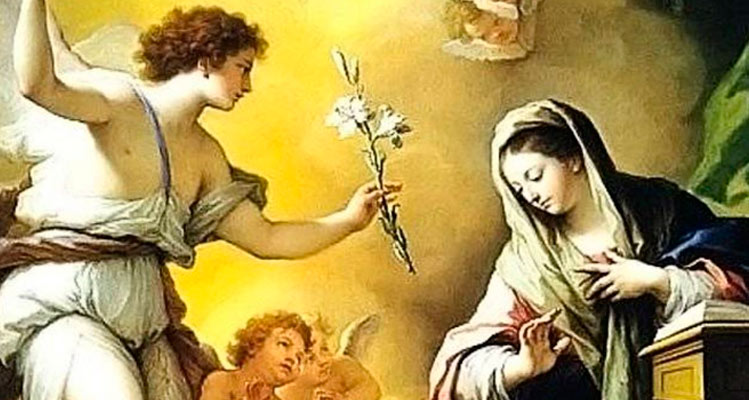
The Solemnity of the Annunciation of the Lord which we celebrate today places us within the mystery of the incarnation of Jesus in humanity. Through the announcement of the Incarnation of the Son of God to the Virgin Mary, God enters our world making himself human just like us. Thus, the Divine Word entering in our midst raises human nature to a level of holiness never imagined by anyone. Mary’s “Yes” testifies to the greatest expression of God’s love for all humanity.
In the mystery of the Incarnation, Mary is the one chosen to be the Mother of God. Confronted with the announcement of the angel, Gabriel, she surrenders herself in an act of faith and humility, willingly accepting her part in the plan of salvation. Mary shows her trust in the Lord by becoming herself an divine instrument in the events which would come. In her consent, Mary accepted the dignity and the honr of divine motherhood as well as the sufferings and the sacrifices that would be linked to it.
On account of her faith and without even knowing what will happen from that moment on, Mary accepts to do God’s will, unconditionally. As the handmaid serving her Lord, she assumes the attitude of total availability.
Mary understood God’s greatness and our “nothingness.” Because of her humility, she was startled when she heard the angel’s greeting: “Hail, full of grace.”
St. Thomas of Villanova tells us how powerful and effective a word can be! By his word God created light, heaven and earthy, but with Mary’s “Fiat” God became a man like us.
By the action of the Holy Spirit, the Son of God was formed within the womb of the Virgin Mary. This, the greatest of all wonders: in the person of our Lord, Jesus Christ, true God and true man, the divine and human natures are one.
According to the Catechism of the Catholic Church, the Annunciation to Mary inaugurates the “fullness of time” (cf. Gal 4: 4), that is, the fulfillment of the promise. Mary is invited to have the One in whom “all the fullness of the Divinity dwelling bodily” (cf. Col 2: 9) conceived within her. The divine answer to her question “How can this be since I do not know man?” (cf. Lk 1: 34) is given by the power of the Spirit: “The Holy Spirit will come upon you” (cf. Lk 1: 35).
St. John Paul II adds that at the time of the Annunciation, by her “Fiat” Mary conceived a man who was the Son of God, consubstantial to the Father. Therefore, she is truly the Mother of God since motherhood concerns the whole person, not just the body and not just human “nature.” It is in this way that the name “Theotokos” – Mother of God – became the proper name granted to the Virgin Mary in virtue of her union with God.
The the Incarnation of our Lord Jesus Christ, we proclaim the Virgin Mary to be the Mother of God. In doing so, we affirm that the Kingdom of God is already in our midst because the dogma of divine motherhood affirms that God Himself entered human history in the person of Jesus Christ.
Let us ask Our Lady, Mother of God and our Mother, for the grace of faith and willingness to readily accept our mission as sons and daughters of God.
Source: text based on the writings of Rita de Sá Freire.